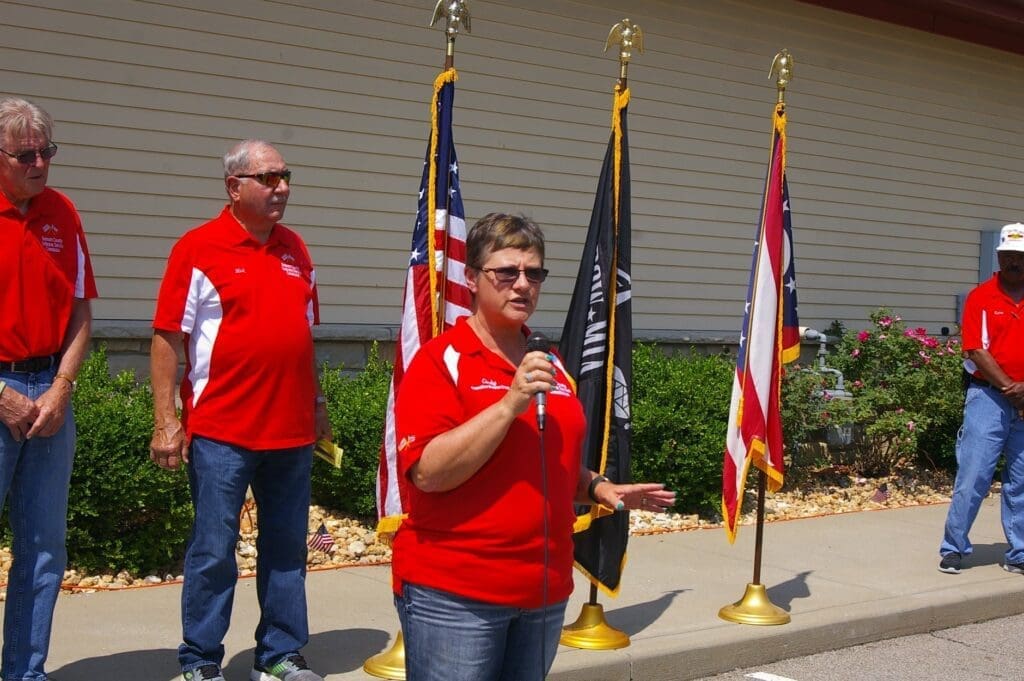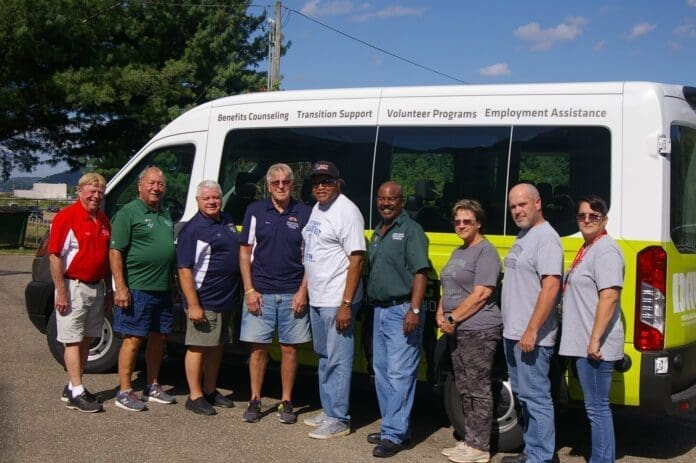United States veterans both recently discharged or having long since retired from service or active duty are entitled to benefits.
The Belmont County Veterans Service Office in Bellaire is one of 88 county offices throughout the state of Ohio that works to facilitate the usage of those services for the state’s nearly 850,000 veterans.
Located at 400 Imperial Plaza in Bellaire, near Kroger, and at the site of the former Northern and Eastern Division courts for the county, Executive Director Lucinda Maupin and her staff are ready to offer a host of services to veterans, all free of charge.
One of the major services offered at the BCVSO is assistance with the filing of Veterans Administration (VA) medical claims, both for care, and compensation.

With the aging of both World War II and Korean War veterans, the majority of claims that come through the office are made by Vietnam Veterans with claims related to Agent Orange.
“Agent Orange is a big thing, and a lot of vets that have Agent Orange-related claims we see that, along with Camp Lejune (claims),” Maupin noted.
Maupin did mention assistance with these claims in particular because there are some attorneys that seek out veterans looking to file said claims and will charge veterans for those services. The staff at the BCVSO are also trained and accredited with the VA to make said claims and do so for free.
“I think it’s really important because there are lawyers out there wanting to do claims and charging for them, and we do it for free,” she said. “They also have to be accredited with the VA and we receive the same training.”
Maupin noted that if a claim case gets appealed, it may get to a point where an attorney is necessary. But even in that instance, her office can recommend a preferred attorney who likely offers a better rate.
A claim needs to be made though, as well as documentation that there is a problem. A veteran cannot come in and say ‘I have Agent Orange’ and make a claim.
But they can come in after seeing a physician with a diagnosis of say diabetes that can be linked to Agent Orange.
“There is no Agent Orange claim. But you can have a disability related to it,” Maupin said. “But if you go to a private doctor and get diagnosed with say diabetes, and you were exposed in-country or on one of the (approved list of) ships, you can file a claim and diabetes is almost automatically approved.
“If you don’t have a disability, you can’t make a claim. Same with Camp Lejune.”

Service-Connected Issues
Claims for coverage and compensation aren’t just limited to major issues like Agent Orange-related illnesses and the types of cancer linked to the water supply at Camp Lejune in North Carolina.
Former paratroopers suffering from knee problems, infantry vets, truck drivers, and tank operators, there are a number of Military Occupational Specialties (MOS) that have conditions that are more associated with them than others.
Because of that, you can and may have a service-connected condition like tinnitus (ringing in the ear) or arthritis, or other conditions associated with your service.
“People don’t realize what’s out there for them,” Maupin said. “If you have arthritis in the knee, for a lot of vets, that’s service-connected. If you jumped out of planes, or if you’re a truck driver and are jumping down off a truck every day. If you were in the infantry. There aren’t a lot of jobs in the military where tinnitus isn’t a potential problem.
“You may have broke an ankle while in (the service) and now are experiencing problems with it.”
For recently discharged veterans, Maupin relayed that now is the time to sign up for and receive health care.
“The VA will almost automatically approve a claim right after you get out because it was definitely service-connected because you just got out,” she said. “If you wait 20 years, it’s harder to prove. They won’t tell you this, but (veterans) come home and basically find out by word of mouth or commercials. But it’s really important. It would be great if (veterans) knew to take good notes in the medical records, get copies of those records, etc.”
Without a service-connected condition, VA care is income based, but their income guidelines are typically higher than those used by the Department of Health and Human Services. Only income is taken into consideration as well, not assets, or savings accounts.
Maupin recommends that, even if you think you’re over the guidelines, to come in, have a financial eligibility form filled out, and see what you might qualify for.
She also cautions against the thought processes some hesitant vets have told her about “not wanting to take up benefits that another veteran could use.
“It doesn’t work like that,” she said. “You paid into it, you’re going to get it. What you get doesn’t take away from someone else. It’s the same with VA claims or health care. You are entitled to that money or care. You can receive your VA money every month and it doesn’t take away from anyone else.”

Financial and Transportation Assistance
Another benefit Maupin’s office provides is financial assistance to those in need when it comes to bills. Utility bills like electricity, water, gas, sewer, and even rent are eligible. Mortgage payments are not because houses are classified as assets, whereas rent for an apartment is not. That being said, the office could assist with bills that frees up the vet’s own money to make a mortgage payment. There are options available.
Other organizations that help in crisis situations need a shutoff notice before help can be initiated. That’s not necessary at the Veterans Service Office. In fact, the sooner help is requested, the better. Maupin noted that it can take up to 10 days (usually not) for the financial paperwork to be completed and the request for funding sent to the courthouse for processing and payment. Assistance is county funded, so the auditor’s office handles the final steps.
Funding is available, but Maupin noted her office averages maybe one request per month and has gone three months this calendar year without a claim. She wants vets to know help is available if needed.
In addition, the office also offers holiday grocery vouchers during the months of November and December.
Vets needing transportation to the VA Hospital in Pittsburgh can also receive transportation free of charge through the office. The BCVSO teamed with the Disabled American Veterans (DAV) organization to purchase the vans, which were donated to the VA. The BCVSO provides its own paid drivers who transport vets back and forth to the VA.
“Because the vans and the drivers are paid with county funds, we take county veterans up to the VA,” said Maupin, noting that West Virginia residents used to be able to receive transportation as well but county vets always received priority.”
For more information, visit the BCVSO online at the link above, or visit it on Facebook.


